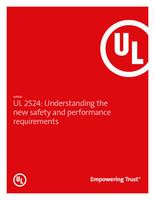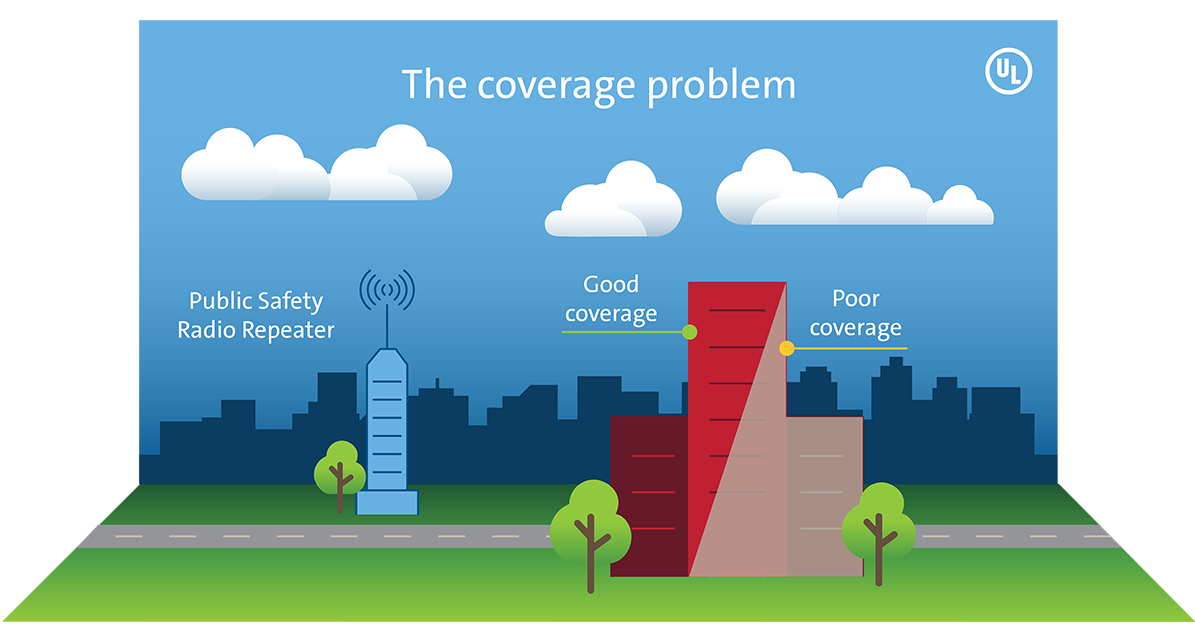
UL 2524: Understanding the new safety and performance requirements (Key Differences Document)
In-building emergency responder radio systems, also known as emergency responder communication enhancement systems (ERCES), are an essential life safety tool that enables communication between responders in and around buildings during an emergency situation. Systems may comprise a combination of the following: repeater, transmitter, receiver, signal booster components, remote annunciators and operational consoles, power supply, and battery charging system components.

Equipped with portable land mobile radios and from within a building, emergency responders can communicate with each other as well as their central dispatch. The message from their device travels through the building antenna system to a signal booster to an exterior antenna to a public safety radio repeater and then to central dispatch. The message is also received by the land mobile radios of other emergency responders on the same communication channel.
In-building emergency responder radio systems are important life safety technology that enable emergency responders to have an effective and reliable means in which to communicate. Environments in and around buildings can often be complex. How the building is designed and constructed, the type of building, other nearby buildings and structures can affect in-building radio communication. Factors outside of the building can also reduce effective in-building radio communication, including such things as the number and communication strength of other communication devices, as well as the electromagnetic noise generated from a myriad of electrical devices in the building’s surrounding area all have an impact. Deploying a dedicated system fit for the purpose of emergency responders is essential to overcome this complexity and helps ensure that it performs as intended and is reliable.

The completed 2021 edition of the International Fire Code (IFC) and the first draft version of 2021 NFPA 1 both include specific requirements for these systems to be certified to UL 2524, the Standard for In-building 2-Way Emergency Radio Communication Enhancement Systems.
This Standard covers a wide range of in-building two-way radio communication products including:
UL 2524 addresses the following areas:
View the full 2524 scope here.
UL Solutions’ technical experts worked with the industry to develop the initial safety and performance standard that ultimately became the ANSI/CAN/UL 2524, first edition published on Oct. 19, 2018. The second edition covering the Standards Council of Canada (SCC) was published on Jan. 9, 2019.
UL Solutions is recognized by OSHA as a Nationally Recognized Testing Laboratory (NRTL) for UL 2524.
UL Solutions is a global, independent, safety-science company that has championed progress and safety for over 125 years. Guided by our mission, UL Solutions’ team of over 14,000 professionals promote safe working and living environments for all people. UL Solutions uses research, standards, and conformity assessment to continually advance and meet ever-evolving safety challenges, and partners with businesses, manufacturers, retailers, trade associations, and regulatory authorities internationally to provide solutions and to address the risks of increasingly complex global supply chains.
Watch the on-demand webinar for an overview of code requirements for UL 2524 geared toward code authorities.
The Safer Buildings Coalition hosted this webinar to breakdown and demystify everything about UL 2524.

UL 2524: Understanding the new safety and performance requirements (Key Differences Document)
Thanks for your interest in our products and services. Let's collect some information so we can connect you with the right person.